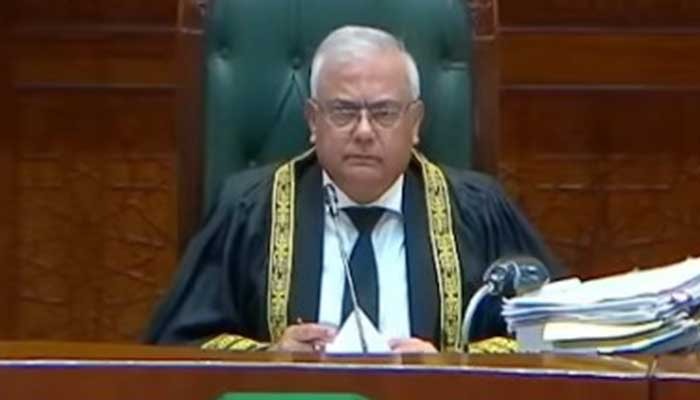ISLAMABAD – Justice Aminuddin Khan on Friday took oath as the first chief justice of the newly established Federal Constitutional Court (FCC).
President Asif Ali Zardari administered oath to the Justice Aminuddin Khan during a ceremony attended by Prime Minister Shehbaz Sharif, Chief of Army Staff (COAS) Field Marshal Asim Munir and others.
Chief Justice of Pakistan Yahya Afridi, Chairman Senate Syed Yousuf Raza Gillani, National Assembly Speaker Sardar Ayaz Sadiq, Pakistan Peoples Party Chairman Bilawal Bhutto Zardari were also among the attendees.
Justice Aminuddin’s appointment was approved by President Zardari upon the recommendation of Prime Minister Shehbaz Sharif, marking a significant step in the formation of the FCC.
The Federal Constitutional Court will have equal provincial representation. Under the 27th Amendment, one of its most critical powers, previously held by the Supreme Court, includes the authority to take suo motu notices.
This means the FCC will now have the power to independently take notice of matters on its own initiative based on petitions.
A day earlier, President of Pakistan approved his appointment on the advice of the Prime Minister, just days before Justice Khan’s scheduled retirement—a move being hailed as dramatic, unprecedented, and historic.
Justice Amin previously headed the Constitutional Bench, has overseen some of the country’s most sensitive and high-profile legal cases, cementing his reputation as a legal authority of the highest caliber.
This historic elevation follows the 27th Constitutional Amendment, recently passed by Parliament and signed into law by the President. The amendment redefines the selection process for the Chief Justice, stipulating that the position must now be held by the most senior Chief Justice, whether from the Supreme Court or the Federal Constitutional Court—a provision that has paved the way for this unprecedented appointment.
Justice Khan completed his early education there and earned his LLB from University Law College, Multan in 1984, along with a diploma in tax law. He started his legal career under the guidance of his father and became an advocate of the Supreme Court in 2001.
His judicial journey includes a tenure at the Lahore High Court from 2011 to 2019, where he gained prominence for his expertise in civil law, particularly property, inheritance, and pre-emption cases. He joined the Supreme Court in October 2019 and was later appointed to lead the Constitutional Bench in 2024.














